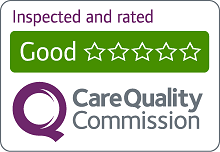Chronic Obstructive Pulmonary Disease (COPD) is a progressive and chronic condition that significantly impacts the lives of those diagnosed and their families.
It hampers breathing, making everyday activities challenging and often leads to a decreased quality of life.
The importance of supportive care cannot be overstated, as it plays a crucial role in managing the disease.
Families and live-in carers are essential in providing COPD help, offering both emotional and practical support.
By understanding how to help someone with COPD breathe better and implementing lifestyle adjustments, environmental modifications, and proactive health management, families can greatly improve the quality of life for their loved ones.
Encouraging a comprehensive approach to care that includes medical treatment along with home and lifestyle changes is pivotal.
This article aims to guide families on the best practices for providing help with COPD, ensuring that their loved ones receive the support they need to navigate this chronic condition effectively.
1. Encourage them to Quit Smoking

Living with COPD is tough for patients and their families, requiring ongoing support. Quitting smoking is vital, significantly easing symptoms and slowing COPD progression.
Support from loved ones is crucial in this journey. It means providing emotional and practical assistance, from finding medical treatment to promoting healthier habits. Encouraging a supportive environment where smoking cessation is prioritised can make a world of difference.
By emphasising smoking cessation, we promote proactive health management, which is the first step towards how to help someone with COPD breathe better and generally live a healthier life. This holistic approach, encompassing lifestyle changes and medical support, is key to enhancing their quality of life.
2. Clean Indoor Air
Maintaining clean indoor air is crucial in managing COPD symptoms and preventing exacerbations, playing a major role in what helps COPD.
To aid in this, using air purifiers can significantly reduce airborne irritants.
Moreover, avoiding indoor smoking and limiting the use of aerosol products are vital steps in how to help COPD.
Regular home maintenance, such as dust control and ensuring proper ventilation, further contributes to a healthier living environment for those with COPD.
3. Seek a Live-in Carer

For individuals with advanced COPD, a live-in carer can be a transformative source of support, offering personalised care and round-the-clock assistance.
Choosing the right carer involves considering their experience, compatibility with the patient, and specific training in managing COPD.
A live-in carer not only aids in daily tasks but significantly enhances the well-being and independence of those with COPD, providing a profound positive impact on their quality of life.
4. Make their Home COPD-Friendly
Creating a COPD-friendly home environment involves thoughtful modifications to ensure comfort and enhance accessibility.
Minimising the use of stairs, reducing clutter, and ensuring good airflow are key steps towards this goal. Incorporating adaptive equipment such as shower chairs, raised toilet seats, and handrails can significantly ease daily activities.
Additionally, creating restful areas and optimising living spaces for easy access are essential recommendations to support those with COPD in maintaining a degree of independence and comfort in their daily lives.
5. Attend Doctor’s Appointments

Accompanying your loved one to doctor’s appointments is key for a comprehensive understanding of their COPD, treatment plans, and progress.
To communicate effectively with healthcare providers, prepare questions beforehand and keep an accurate record of symptoms and any changes in medication.
Active involvement in the care plan and advocating for your loved one’s needs and preferences are crucial steps in ensuring they receive the best possible support and care.
6. Educate Yourself
Self-education on COPD is crucial for live-in carers and family members, encompassing understanding the disease process, medication management, and recognising signs of exacerbation.
Resources for obtaining reliable COPD information include pulmonary rehabilitation programs, support groups, and materials from reputable health organisations.
It’s important to encourage ongoing learning and adapt care strategies in line with the latest COPD research and guidelines, ensuring that care remains current and effective.
7. Recognise Signs of Distress

Identifying early signs of COPD exacerbation, such as heightened shortness of breath, changes in mucus, or diminished energy levels, is key to managing the condition effectively.
It’s crucial to know when and how to seek immediate medical attention for severe distress signs.
Daily monitoring and documenting symptoms can significantly aid in managing COPD and facilitate effective communication with healthcare providers.
This proactive approach ensures timely intervention and can help in stabilising the condition, preventing further complications.
8. Assist with Mobility
Supporting and enhancing mobility for a loved one with COPD is essential.
Utilising mobility aids such as walkers or wheelchairs can significantly improve their independence and safety.
Tailoring physical activities and exercises to the individual’s capabilities, focusing on improving endurance and respiratory function, is also recommended.
Additionally, offering advice on conserving energy and pacing daily activities can help prevent fatigue and shortness of breath, enabling those with COPD to engage more fully in life’s activities.
9. Emergency Preparation

Planning for emergencies is crucial for those with COPD; having a readily accessible list of medications, emergency contacts, and a clear action plan for exacerbations can provide peace of mind.
It’s also valuable to highlight to family members and live-in carers about emergency procedures and the location of essential items, such as oxygen supplies and inhalers.
Additionally, discussing advance directives and healthcare proxies ensures that the loved one’s wishes are respected.
10. Maintain a Healthy Diet
Nutrition plays a critical role in managing COPD, with certain foods supporting lung health and aiding in weight management, as both underweight and overweight conditions can exacerbate COPD symptoms.
Preparing easy-to-prepare, nutritious meals is essential, taking into account the energy limitations and dietary needs of someone with COPD.
Moreover, maintaining proper hydration is vital; however, it’s important to manage fluid intake to prevent fluid overload while ensuring adequate hydration, and balancing the body’s needs effectively.
Supporting a loved one with COPD involves a comprehensive and collaborative approach that encompasses medical treatment, lifestyle adjustments, and supportive care.
By understanding how to help someone with COPD breathe better and implementing these practices, families can significantly improve the quality of life for their loved ones diagnosed with this chronic condition.
If you’re looking for help and support with COPD home care, then speak with us today at IP Live-in Care for more information.
